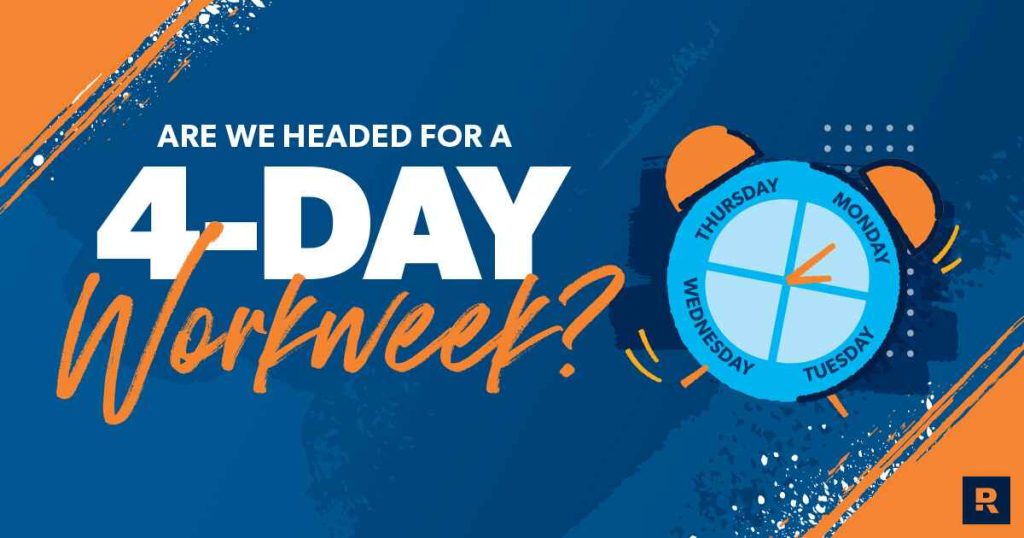There’s a lot of talk lately about a four-day workweek—both here in the United States and across the globe. The U.K. just finished the world’s largest four-day workweek experiment ever recorded.1 In Iceland, 86% of the workforce has started running on a shorter schedule (like a four-day workweek) or can negotiate shorter hours.2 Spain, New Zealand and Japan are giving it a shot, and a California congressman introduced legislation to make the four-day workweek happen here in the States.3 Needless to say, this trend is picking up speed.
And the reports don’t lie. A recent survey shows that 56% of people polled would work longer days in exchange for a four-day workweek, and 33% would quit their job to find one with a four-day workweek.4 These numbers are staggering. And there’s no denying a four-day workweek could be life-changing for some people.
So, let’s talk about the pros and cons of a four-day workweek and how this schedule could impact you.
Why Do We Even Have a 5-Day Workweek (40 Hours)?
First, let’s back up a minute. Our standard 40-hour workweek came from Henry Ford, the car guy. The workers in Henry Ford’s factory were putting in eight-hour days six days a week. That meant they only had one day off to catch a break. Not exactly an ideal working situation.
So, Ford took matters into his own hands. When he gave his workers two days off, he saw a huge increase in productivity, not a decrease. And the idea caught on. Ford inspired other leaders to adopt his policy, which helped turn the whole cultural tide against overworking. In 1940, congress changed the Fair Labor Standards Act to make employers pay workers overtime if they worked more than 40 hours—and the 40-hour workweek became a done deal.
What Is a 4-Day Workweek?
A four-day workweek means people are working 32- to 36-hour weeks (maybe even less)—not full 40-hour weeks. This is different from shift work, where people work 40 hours over a shorter week. With a four-day workweek, you’re guaranteed a three-day weekend every week. And did I mention the pay doesn’t decrease? That’s right—you still get the same salary or hourly pay as if you’re working a full five days.
You might be saying, “You had me at a three-day weekend!” Or maybe you’re wondering how productive people can really be if they’re only working four days. No matter which camp you’re in, let’s dive into the data together.
What 4-Day Workweek Statistics Show Us
The results from the U.K.’s recent four-day workweek experiment are hot off the press, and they show some fascinating trends. It was the world’s largest four-day workweek trial, involving 61 companies and about 2,900 workers over six months in 2022. Here are some results of the experiment:5
- 56 out of 61 companies that participated decided to keep the four-day workweek. That’s 92% of the companies!
- 71% of employees reported reduced levels of burnout at the end of the study, not to mention less fatigue, anxiety and sleep issues.
- Company revenue rose by 1.4% on average—a steady gain.
- Staff turnover dropped by 57% during the trial.
Wow. Now, these companies that participated used a combination of four-day schedules, but the results were largely the same. Working a four-day week led to higher employee satisfaction, increased wellness and a more productive work environment.
This was confirmed by YouTube commenter Starboy876 who left this note on my video about four-day workweeks: “I can say I work 4 days a week for 10 to 12 hours a day and very much enjoy it. It’s a better work-life balance . . . the best feeling of my adult life!” There you go, folks.
4-Day Workweek Benefits vs. Cons
Okay, we went over some of the benefits. Now, let’s dig a little deeper. There are a lot of pros and cons that you might not expect when it comes to the four-day workweek.
Pros of a 4-Day Workweek
1. Avoiding Burnout
Americans working full-time jobs put in an average of 44 hours a week.6 And you know a whole lot of people are working way more than that, which is why we’ve got a problem with workaholism in our country.
You deserve to win at work. Our new book and assessment will show you how.
The more rest you can get, the easier it is to avoid being overworked. The benefits from this are huge—not only for your mental health (which is a big deal), but for the quality of your work too. The less workplace burnout you feel, the more likely you are to stay invested in your job and actually produce quality work. In fact, 39% of employees in the U.K. study reported feeling less stressed on a shorter work schedule.7
2. More Intentionality About the Way You Work
If you know you only have four days in the week to get stuff done, then you might be more careful about how you schedule your days. You’ll probably try harder to stay focused and have fewer interruptions too. If you’ve been kicking back and phoning it in on Fridays, a four-day workweek might be the kick in the pants you need.
3. Better Work-Life Balance
It’s a simple math formula: The more time you spend at the office, the less time you spend with family. And you can’t get those moments back. Being able to have a better work-life balance can make you and your family a whole lot happier and healthier.
And even if you don’t have a family of your own, work-life balance is still important—you can spend more time with friends, volunteer for church activities, or pursue your hobbies.
According to the U.K. study, 54% of participants found it easier to balance work and family responsibilities, and 62% found it easier to combine working and maintaining a social life.8
4. More Time for Personal Development and Self-Growth
Time spent working on yourself outside of the office can make you better in the office. Personal growth can go a long way in developing your leadership skills, connecting with others, and even improving your self-confidence. And if you’re only working four days a week, you’ll have more time on your hands to grow in these areas.
Cons of a 4-Day Workweek
1. Less Time to Get the Job Done
Sure, having a longer weekend might be great, but the truth, is a four-day workweek gives you less time to collaborate and get your work done. That’s the harsh reality here. If you’re only working four days, then the pressure is on to jampack all you can into four days.
2. Higher Levels of Stress
If you’re pressured to cram as much work and meetings as you can in only four days’ time, your stress levels could end up being higher than they were during the five-day workweek.
3. Unsatisfied Customers
Think about it: If your whole business shuts down every Friday, your customers might not be too happy about it. After all, five-day workweeks are still the norm for most people. It makes sense that the people you serve would expect that from your business.
Will a 4-Day Workweek Happen in America?
Don’t hold your breath, people. Traditional work has changed a lot over the past few years—that’s a fact. And research shows plenty of benefits from working just four days a week. Although it would take a lot to convince most businesses to go for this change, some companies are already embracing this schedule. Just like remote work, it’ll depend on the company and how they want to run things. If the four-day workweek appeals to you, look for companies that have that as a benefit—just don’t expect to find a ton of them yet.
Look, if you hate your job, working one day less isn’t going to solve the real problem here. The bigger question is how you can do work that matters to you and go from just collecting a paycheck at your J-O-B to living out your dream job with purpose. This is a huge pain point for most American workers—nearly 70% of Americans aren’t engaged at their jobs.15 But it doesn’t have to be that way. That’s why I wrote my book From Paycheck to Purpose—to give you a clear, step-by-step plan to finding work you love.
Read the full article here











